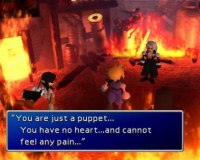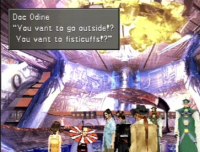

| |
Final Fantasy VII's success was a combination of
rave reviews, good marketing, and the name 'Final Fantasy'.
|
When Final Fantasy VII was released in Japan in
1997, the result was nothing short of hysteria.
Thousands upon thousands of rabid gamers, many of
whom had been camping out in the streets next to their
favourite game stores for days, rushed to purchase their
copy of the most eagerly anticipated PlayStation release ever.
Previous sales records were broken within a matter of hours,
and within days Final Fantasy VII had become one of the most
successful titles in videogame history. Before long, the
developer, Square, had sold almost as many copies of
the game as there were PlayStations in Japan - virtually
every Japanese PlayStation owner now has a copy of
Final Fantasy VII. There was even a run on PlayStations
themselves, as dedicated role-playing fans brought
machines simply to play the latest Final Fantasy game. No
previous PlayStation title had caused anything like as
much fuss.
What made Final Fantasy VII stand out even more
was that its massive success translated readily to the
tastes of Western gamers. For years, the videogames industry
had been laboured under the impression that English-speaking
gamers just didn't 'get' Japanese role-playing games, with the
result that precious few were ever translated. Quite
how this piece of received wisdom was started is something of
a mystery, especially considering the success of those few games
that did make it across to North American or British shores. Still,
Square's insistence on releasing Final Fantasy VII in both Europe and North America
was seen by many as a questionable decision - indeed, rumours
abound that Sony itself was none to keen on the idea to
begin with.

Luckily, with millions of copies already sold in Japan, Square had the
commercial muscle to make an overseas release happen and Final Fantasy
VII duly made its way to North America with amazing results. Within weeks of
the North American version being confirmed, the game racked up more
pre-orders than any previous PlayStation title, and within only
three months of hitting the shelves, sales soared past the million copies mark.
When the UK version finally arrived, it was greeted in a similar way. Released just
before Christmas 1997, alongside several other top-notch competing titles,
Final Fantasy VII yet again managed to surprise everyone, including
its distributor, Sony Computer Entertainment Europe. The game was one
of the biggest sellers over the traditionally tough holiday season, and
succeeded in outstripping even the most generous expectations.

| |
In both their first two weeks, Final Fantasy VIII grossed
more than the blockbuster Titantic.
|
After years of rumour, seemingly endless speculation, and tantalising
screenshots and demos aplenty, Square released Final Fantasy VIII world-wide
in 1999. With sales pushing onto to ten million units, Square can consider it
to be another huge success. And now we eagerly await Final Fantasy IX, which Sakaguchi (Final Fantasy's
creator and chief architect) has labelled as being the one 'true fans have been waiting for' and 'the most
complete Final Fantasy yet'.
Final Fantasy and the PlayStation are now inextricably bound together, however;
Square's role-playing pedigree stretches back much, much further. It wasn't just
the rave reviews and stunning advertising that caused thousands of Japanese gamers
to queue for days and even buy PlayStations just to play the epic. As the
game's endless title makes clear, Final Fantasy VII, while being the first to be
designed for Sony's cute grey box, was far from the first Final Fantasy game.
In fact, the history of the series stretches back more than 11 years and
(including the many spin-off games) across four hardware platforms.
In case you've ever wondered just what happened to the earlier titles, we
take a look at how the genre started, game by game...

|

